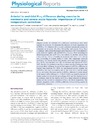Identificador persistente para citar o vincular este elemento:
https://accedacris.ulpgc.es/jspui/handle/10553/47359
| Título: | Arterial to end‐tidal Pco2 difference during exercise in normoxia and severe acute hypoxia: importance of blood temperature correction | Autores/as: | Losa-Reyna, José Torres-Peralta, Rafael González Henriquez, Juan José Calbet, José A.L. |
Clasificación UNESCO: | 241106 Fisiología del ejercicio | Palabras clave: | Blood temperature Gas exchange Gradient Hypoxia PCO2 |
Fecha de publicación: | 2015 | Publicación seriada: | Physiological Reports | Resumen: | Negative arterial to end-tidal PCO2 differences ((a-ET)PCO2) have been reported in normoxia. To determine the influence of blood temperature on (a-ET)PCO2, 11 volunteers (21 ± 2 years) performed incremental exercise to exhaustion in normoxia (Nx, PIO2: 143 mmHg) and hypoxia (Hyp, PIO2: 73 mmHg), while arterial blood gases and temperature (ABT) were simultaneously measured together with end-tidal PCO2 (PETCO2). After accounting for blood temperature, the (a-ET) PCO2 was reduced (in absolute values) from -4.2 ± 1.6 to -1.1 ± 1.5 mmHg in normoxia and from -1.7 ± 1.6 to 0.9 ± 0.9 mmHg in hypoxia (both P < 0.05). The temperature corrected (a-ET)PCO2 was linearly related with absolute and relative exercise intensity, VO2, VCO2, and respiratory rate (RR) in normoxia and hypoxia (R2: 0.52- 0.59). Exercise CO2 production and PETCO2 values were lower in hypoxia than normoxia, likely explaining the greater (less negative) (a-ET)PCO2 difference in hypoxia than normoxia (P < 0.05). At near-maximal exercise intensity the (a-ET)PCO2 lies close to 0 mmHg, that is, the mean PaCO2 and the mean PETCO2 are similar. The mean exercise (a-ET)PCO2 difference is closely related to the mean A-aDO2 difference (r = 0.90, P < 0.001), as would be expected if similar mechanisms perturb the gas exchange of O2 and CO2 during exercise. In summary, most of the negative (a-ET)PCO2 values observed in previous studies are due to lack of correction of PaCO2 for blood temperature. The absolute magnitude of the (a-ET)PCO2 difference is lower during exercise in hypoxia than normoxia. | URI: | https://accedacris.ulpgc.es/handle/10553/47359 | ISSN: | 2051-817X | DOI: | 10.14814/phy2.12512 | Fuente: | Physiological Reports, [ISSN: 2051-817X] v. 3 (10). e12512 |
| Colección: | Artículos |
Citas SCOPUSTM
15
actualizado el 08-jun-2025
Citas de WEB OF SCIENCETM
Citations
16
actualizado el 22-feb-2026
Visitas
168
actualizado el 01-nov-2024
Descargas
167
actualizado el 01-nov-2024
Google ScholarTM
Verifica
Altmetric
Comparte
Exporta metadatos
Los elementos en ULPGC accedaCRIS están protegidos por derechos de autor con todos los derechos reservados, a menos que se indique lo contrario.
